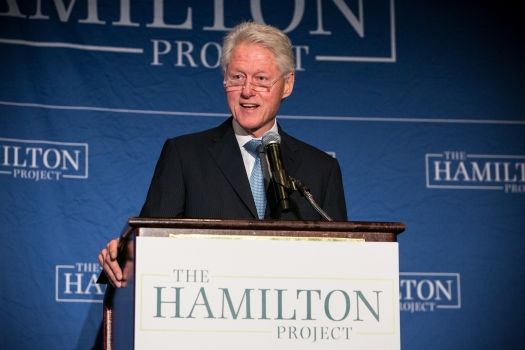
“Poverty is not just a statistic; it’s the story of peoples’ lives. It’s really a description of people who don’t have enough to live on and don’t have enough to raise kids decently on. Its persistence is a severe constraint on economic growth and maybe even worse, it is a profound constraint on social mobility.”
These were the words spoken by the 42nd president of the United States and founder of the Clinton Foundation, the Honorable Bill Clinton, in his keynote address at The Hamilton Project’s two-day summit, Addressing America’s Poverty Crisis.
In the introduction to a new volume of papers released on June 19, The Hamilton Project reported that “15% of Americans are in poverty, and many individuals and families weave in and out of poverty” which “threatens our nation with the prospect of a permanent class of individuals who are unable to contribute productively to and benefit from a thriving economy.”
As “childhood poverty often means growing up without the advantages of a stable home, high-quality schools, or consistent nutrition” and “adults in poverty are often hampered by inadequate skills and education, leading to limited wages and job opportunities,” The Hamilton Project explained that “the social and economic costs of poverty remain as real as ever and threaten to undermine the nation’s social fabric and economic future.” Moreover, one particular concern is that “children born into deprivation will live their lives stuck in a perpetual poverty trap.”
In his keynote remarks, President Clinton emphasized that “when we address poverty, we’re really talking about a piece of America’s quilt, something that belongs to all of us.” He stressed the importance of policy and collective effort to combat poverty, explaining that “it’s about the collective viability as a nation, and not just economically, but also socially, even morally” in order to “develop our human potential.” As such, “we should be working together for a country with more shared opportunities, shared prosperity, assuming more shared responsibilities.”
President Clinton wove anecdotes, experience, and policy together in his discussion to address the topic of poverty. He enumerated several important points that policy makers and individuals considering poverty must keep in mind:
- “Intelligence and effort, the willingness to work, and dreams are pretty well evenly distributed throughout the world.” However, as President Clinton points out, “what are not evenly distributed are opportunities, preparation, and the supportive environment necessary to succeed.”
- “There is no silver bullet” that will solve the problem of poverty. President Clinton explains that “no one policy, no new bright idea, no new technology alone can deal with this.”
- The fight against poverty will require participation from every segment of society. As President Clinton pointed out, “there is a mountain of social science evidence that shows that when people work together in diverse groups, they make better decisions than when geniuses act alone.”
- “We should listen to poor people and look at their surroundings” as “poverty has many faces and unheard voices.” President Clinton stresses that those in poverty “need not be patronized. They don’t want entitlements. What they really want is empowerment, and we need to give them policies that provide that.”
- “Culture matters.” President Clinton lauds various companies whose intrinsic culture has shaped not only their success but the wellbeing of their employees.
- “Government has a significant role to play in all this, and it has to play it.” President Clinton made reference to many influential government policies from the past and described their positive impact on society. These examples served to convince the audience that “we can do this. There is really no excuse for the neglect we have shown, especially to our children. We can do this, and it isn’t that expensive.”
Offering praise, support, and suggestions, President Clinton also spoke directly in response to several of the policy measures featured in The Hamilton Project’s collection. Among his comments, the former president emphasized the need to increase student retention, increase accessibility of college to those from underprivileged backgrounds, and to “incentivize universities to hold down costs.” He also suggested coordinating the efforts of non-profit anti-poverty organizations “so as to amplify the combined impact of them.”
President Clinton concluded his address by stating that “we should try to create a world in which everyone can be proud to pay taxes because they have good incomes, and they can take care of their kids, and they know what the money’s buying — and it’s buying a return of the American dream.”


